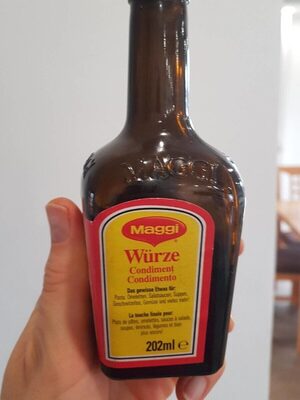
Barcode: 4005500016236
Maggi Würze
HALAL
📝 Reason: Maggi Würze ingredients mostly appear Halal, but ‘flavoring’ and ‘disodium inosinate’ are doubtful as their sources (plant, synthetic, or animal) are unspecified and not Halal-certified. In Islamic jurisprudence (Quran 5:3), if there is doubt about ingredient sources, one should avoid them, making this product overall Doubtful until certification is provided. (Sources: IFANCA, halalfoodmaster.com, www.foodchemadditives.com).
🏷️ Category: Beverages And Beverages Preparations, Plant Based Foods And Beverages, Beverages, Plant Based Foods, Condiments, Culinary Plants, Groceries
📄 Certificates: Vegetarian, Vegan, Made In Germany, Vegetarisch, Vegan
Ingredients:
Details
Is Maggi Würze Halal? Uncover the Truth About Its Ingredients
When it comes to ensuring our food choices meet Halal standards, it’s vital to be informed about the ingredients in our favorite products. Maggi Würze, a popular seasoning, is often frequented in kitchens worldwide. In this post, we will explore the Halal status of Maggi Würze, break down its ingredients, and help you understand the nuances involved in its Halal certification.
Halal Status Overview
According to available information, Maggi Würze is declared as HALAL. However, certain components raise questions due to their unspecified sources. Ingredients like ‘flavoring’ and ‘disodium inosinate’ can potentially derive from non-Halal sources, making their status doubtful. As outlined in Islamic jurisprudence (Quran 5:3), ingredients with uncertain origins should be avoided unless certified Halal.
Ingredient Breakdown
- Hydrolyzed Plant Proteins (Water, Wheat Protein, Salt)
This ingredient comes from plant sources, primarily wheat or soy. It is hydrolyzed, meaning it’s broken down into smaller units for flavor enhancement. Importantly, there are no animal products or alcohol present, thus deeming it Halal. You can learn more at IFANCA. - Water
Plain water is universally regarded as Halal. It does not undergo any processing that could compromise its status. For more information, check Halal Food Master. - Flavoring
‘Flavoring’ is a broad term, which can come from different sources, including animal, plant, or microbial. Without additional specifics, its Halal status remains uncertain. There is no Halal certification designated for this ingredient, referring to the sources at Halal Food Master and IFANCA. - Flavor Enhancers (Monosodium Glutamate, Disodium Inosinate)
Monosodium glutamate (MSG) is typically Halal, as it is synthetically produced. On the other hand, disodium inosinate can have animal origins, including from non-Halal meats. Unless specifically marked as plant-based or Halal-certified, it is treated as doubtful. More details can be found in the discussions at Halal Food Master and Halal Food Master. - Salt
This ubiquitous condiment is a naturally occurring mineral and classified as Halal. Its origins are unequivocally Halal-friendly. Full details are at Halal Food Master. - Sugar
Typically, sugar is Halal. In the EU and Germany, it does not undergo processing with bone char, which is a common concern regarding sugar’s Halal status. Thus, in these regions, sugar can be comfortably labeled Halal. You may refer to Halal Food Master for more insights.
Brand and Certification Context
Maggi, known for its culinary innovations, provides a range of products under various certifications including vegetarian and vegan labels. While it is useful to see these certifications on packaging, they do not specifically indicate Halal compliance. Consumers should remain vigilant and seek verification for Halal status through recognized certification bodies.
Conclusion
In summary, while Maggi Würze has an overall Halal status, the presence of certain questionable ingredients calls for further scrutiny. If you often use this product, ensure that you source additional knowledge from reliable resources and consult with Halal-certifying bodies. This way, you can make informed decisions that align with your dietary needs. Stay safe, and happy cooking!
